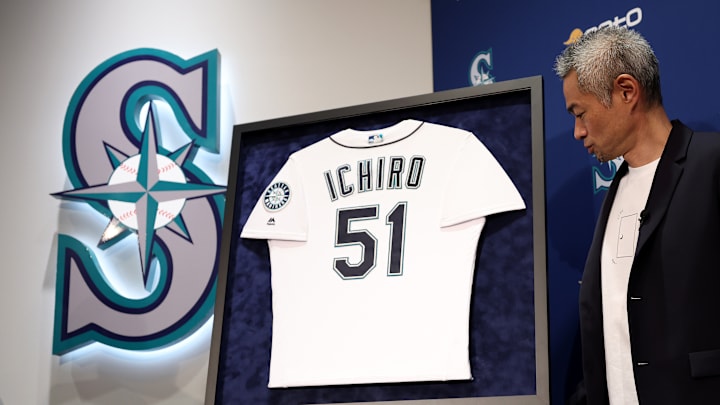The 2025 National Baseball Hall of Fame class was announced on Jan. 21, and three deserving players were announced as the honorees in baseball's 90th Hall of Fame class.
We present the @BaseballHall Class of 2025! 🤩 pic.twitter.com/i4Lp74oDlf
— MLB (@MLB) January 22, 2025
Along with Dick Allen and Dave Parker — who were voted in via the Classic Era Committee vote — Ichiro Suzuki, CC Sabathia, and Billy Wagner comprise the 2025 HOF class. Some of the best players at their respective positions in their era, those three were worthy selections, and both Ichiro and Sabathia made the Hall on their first try.
There's plenty to take away from the voting results that are now available to us fans, including some trends that could prove troubling for the next few years of Hall voting.
Ichiro isn't a unanimous Hall of Famer, and there might not be another one for a long time
Somehow, one of the 394 voters in this year's BBWAA voting cycle determined that Ichiro Suzuki was not worthy of making the Hall of Fame.
Now, that's obviously an oversimplification of what happened. Perhaps the voter decided that Ichiro, who had 3,089 hits despite not making his MLB debut until he was 27 years old, was a mortal lock for induction, and chose to use one of their ten votes on a player they were worried was at risk to fall off the ballot.
Maybe that's giving them too much credit, but either way, it feels wrong that the Seattle Mariners luminary didn't get 100% support from the most acclaimed writers of the sport. Ichiro, after all, had a lifetime batting average of .311, earned 10 consecutive Gold Gloves and All-Star appearances to begin his career, and stole 509 bases for good measure. He is also the only player in history to win a league MVP award during his rookie season
An argument often used against unanimous Hall induction is the idea that no one, other than Mariano Rivera, has ever earned that distinction. If Babe Ruth, Ty Cobb, Derek Jeter, Willie Mays, and countless others didn't deserve to be unanimous, then why should anyone be?
That's nothing more than a shallow argument against greatness. The mistakes of past voters should not weigh on the collective consciences of the voters today.
Of course, we may never know who refused to vote the all-time great outfielder in, but the truth remains that Ichiro, as much as anyone in baseball history, was deserving of being a unanimous selection.
If Ichiro couldn't do it, it's hard to imagine if anyone will in the near future.
Torii Hunter hangs on, many others do not
By one singular vote, Torri Hunter, who had a great career for both the Minnesota Twins and Los Angeles Angels, remained on the ballot in his fifth year.
Hunter’s defensive brilliance is his calling card. Known as “Spider-Man” for his ability to rob home runs with jaw-dropping leaps at the wall, he won nine Gold Gloves over a 10-year span. His defensive impact in center field helped define his era, a rare achievement in a sport increasingly driven by offense. He is one of seven players in MLB history with 350+ home runs and 9+ Gold Gloves.
After appearing on 7.8% of ballots in 2024, he made just 5.1% in 2025. Barring an incredible turnaround, his chances at the Hall appear to be approaching zero, despite his brilliant career.
While Hunter found a way to stick around, many did not. In total, ten players fell off the ballot, all in their first year eligible.
Ian Kinsler was the only player among them to amass even 2.5% of the vote (10 votes in total), while three players failed to garner an iota of support (Ben Zobrist, Hanley Ramírez, and Fernando Rodney).
First-year players didn't have a good year overall, save for the inductions of Suzuki and Sabathia. Only King Felix Hernandez (20.6%) and Dustin Pedroia (11.9%) lived to see another year on the ballot.
The 2026 Hall of Fame class could look pretty empty
Looking ahead to next year's Hall of Fame class might feel a bit premature, but it shouldn't inspire much confidence among fans looking to see a big group of players get inducted.
On the remaining ballot, only Carlos Beltrán (3rd year, 70.3%) and Andruw Jones (8th year, 66.2%) garnered even 40% of the vote this year. The next highest remaining candidate, Chase Utley, only received 39.8% of the vote in his second year of eligibility.
This is the point where we normally turn to the upcoming class of first-year players to serve as a saving grace. Unfortunately, that's going to disappoint fans even further.
The 2026 Hall of Fame ballot will come equipped with upwards of 18 freshman. Among them, only Ryan Braun and Cole Hamels accrued 40+ WAR, and none of the other sixteen had a "peak" that will deserve enough consideration to stick around on the ballot for long.
Of course, Braun himself may struggle to gather much support, as his connection to the PED scandal that swept through baseball in the 2010s will certainly put a damper on what was otherwise a fine career.
Hamels, who logged a 3.43 ERA and 2,560 strikeouts in 2,698.0 career innings, should be able to convince voters that he deserves a long look for Hall consideration. He never finished higher than fifth in Cy Young voting, but he was utterly instrumental in the Phillies' 2008 championship, winning both NLCS and World Series MVP.
It's likely going to take Hamels at least a few years to get enough support to make the Hall, though. Unless Beltran and Jones finally cross the required 75% threshold, next year's class is going to have a hard time finding worthy players.
